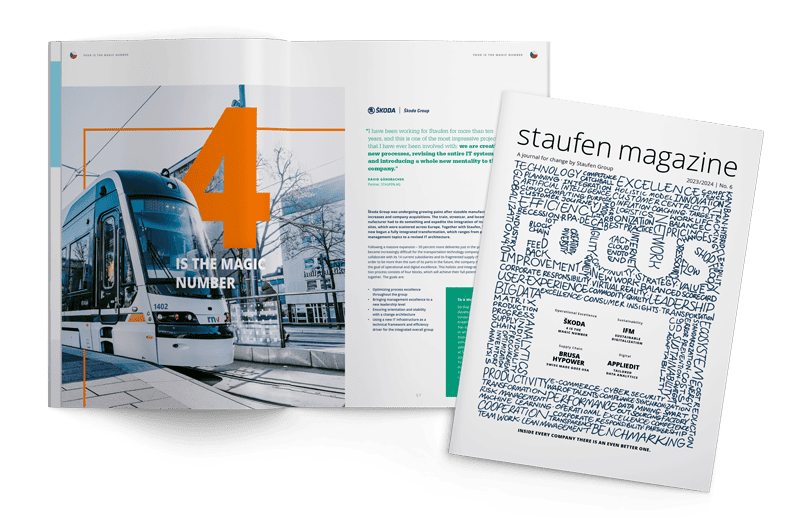
If, for example, a company owner cannot find a successor for his life’s work, Indus Holding is one of the top addresses in Germany. But the holding company from Bergisch Gladbach, Germany, not only buys companies, but also makes them better in the long term – as in projects with Staufen AG.
Many successful medium-sized companies in Germany are run by families. This often makes succession planning a particular challenge for them. The Institute for SME Research in Bonn estimates that by 2026 around 30,000 family businesses will have to be handed over every year because the owners are leaving for personal reasons. “Many find it difficult to separate from the company they have built themselves. Nevertheless, they should arrange the successor in good time to ensure the success of their life’s work,” says Christoph Wurst, who heads the private equity division at Staufen AG.
Long-term home for medium-sized companies
If there is no one in the family or in the management of the company to find a successor, selling it to an investor like Indus Holding from Bergisch Gladbach often helps. “As an industrial holding, we buy and develop technology-oriented medium-sized companies,” explains Axel Meyer, Member of the Board of Indus Holding AG. Indus concentrates on companies in the engineering, infrastructure and materials segments. The group currently has 45 portfolio companies.
“In the industry, we are known as a long-term home for medium-sized companies,” Meyer continues. The high profile of Indus often leads to entrepreneurs calling Bergisch Gladbach directly or, as a first step, simply writing an e-mail. Indus board member Meyer likes this typical hands-on mentality of successful entrepreneurs: “These are the best cases when the owner trusts us from the beginning to continue his life’s work”.

Axel Meyer
Member of the Board
Indus Holding AG


The investor as a sparring partner and coach
When a company is sold to Indus, it retains a high degree of entrepreneurial freedom: “All of our acquisitions are very successful and have established business models. We want to develop them further, for example by promoting their internationalization and thinking about new product families. We see ourselves as a sparring partner and coach, but not as an operationally intervening executive floor.”
Keyword coaching: The Indus initiative “Improving Performance” is intended to support companies in continuously improving their business processes. The aim is to optimize both market positioning and operational excellence. In the area of lean management, Indus has therefore set up a multi-stage training and further education program together with Staufen and has already trained around 100 specialists and managers in operational excellence over the years. “Together, we equip the companies with the necessary methods and the corresponding know-how. This initial training then means that they can independently tackle further improvement issues,” explains Axel Meyer. Staufen consultant Jürgen Endress adds: “Our training courses also offer the specialists and managers of the portfolio companies a great opportunity to learn from one another and to network.”
Exchange with open visor
And what is the relationship between holding company and participation like in rough times? Axel Meyer has no concerns about that: “If the result comes under pressure due to a deterioration in the general conditions – such as significantly higher material and energy prices etc. – we as a holding company move closer to the company. In direct exchange, so to speak with an open visor, we look for solutions together with the portfolio company. And then we drive it forward with all our might, with money and expert knowledge. At the same time, we have the necessary patience to allow things to develop. In contrast to classic private equity providers, we not only support a company for a predetermined period of time, but permanently with the aim of keeping it value-adding.”

The company
Indus Holding AG is a German investment company listed in the SDAX. The company was founded in 1989 and is based in Bergisch Gladbach. Indus invests long-term in technology-oriented hidden champions in German-speaking medium-sized companies and currently holds 45 portfolio companies. In 2022, the Indus Group generated sales of around 1.8 billion euros with around 10,000 employees.
1989
founded
10.000
employees
1,8
billion € sales
Request the English Magazine now as a digital or print version

You might also be interested in

Lean Management: The path to winning mentality
The Binder family company shows how lean management can not only make you better and faster, but also inspire employees and customers. Our current study “Future Industry 2023” also underlines how effective lean management is for companies to develop more resilience despite cost pressure.
Read more
The best strategy? Less, but consistent!
An interview with Max Illies, Vice President Sales at C. Illies & Co. who speaks about Hoshin Kanri and an effective strategy implementation.
Read more
Stratégiai kivállóság
The question that currently needs to be asked is why strategy is now gaining renewed attention among many companies. In our opinion, this can be attributed to two developments: First, over the past few years, external influences such as political decisions or shorter technology cycles on companies and their market environment have increased significantly in strength and speed. This puts the added value that companies generate for their customers under much more rapid and sustained pressure than was the case a few years ago. Another is that many companies are experiencing more and more problems with implementing their strategic initiatives. Recent studies have shown that the rate of ineffective strategic initiatives is around 50%. This translates to a waste of resources that companies can no longer afford.
Read more
